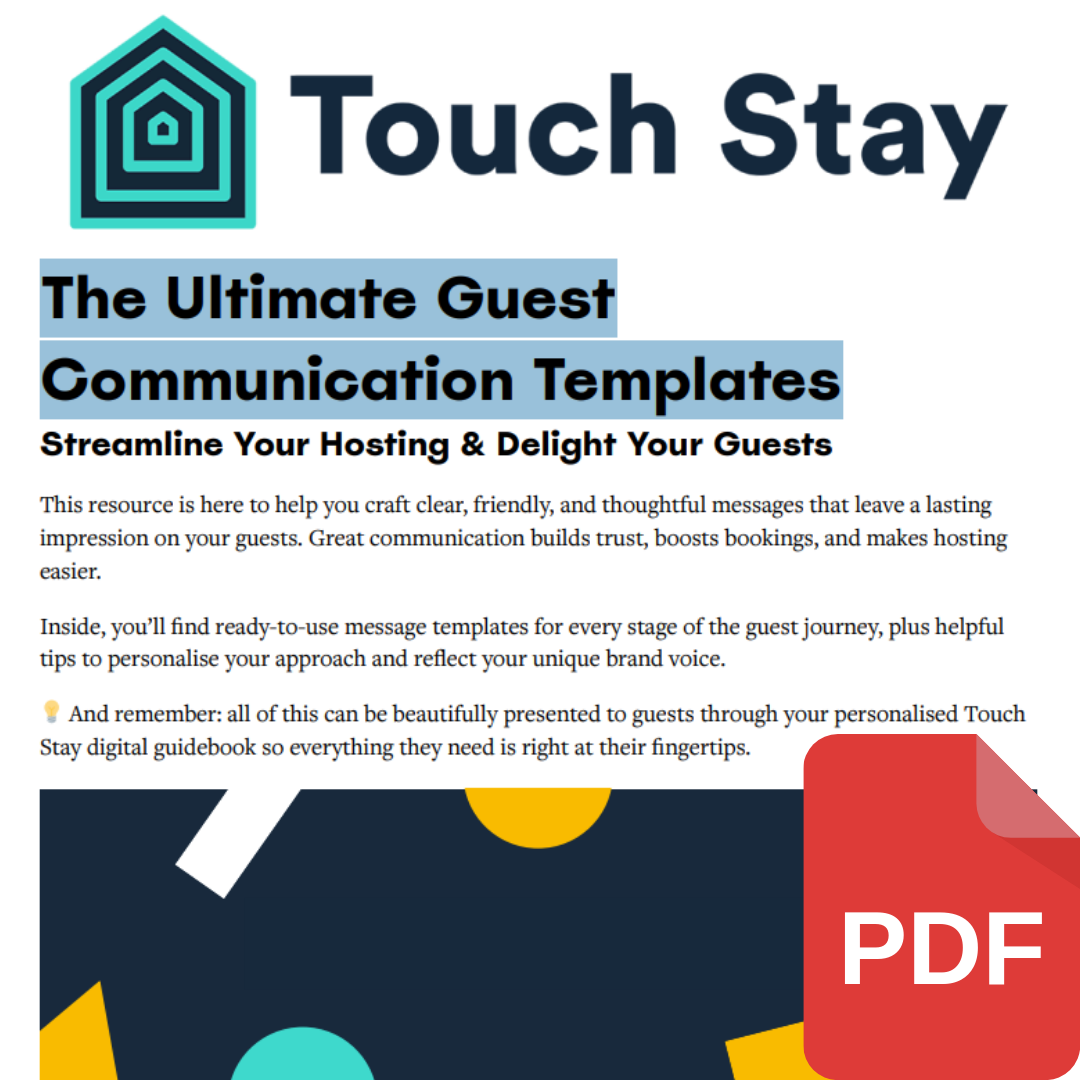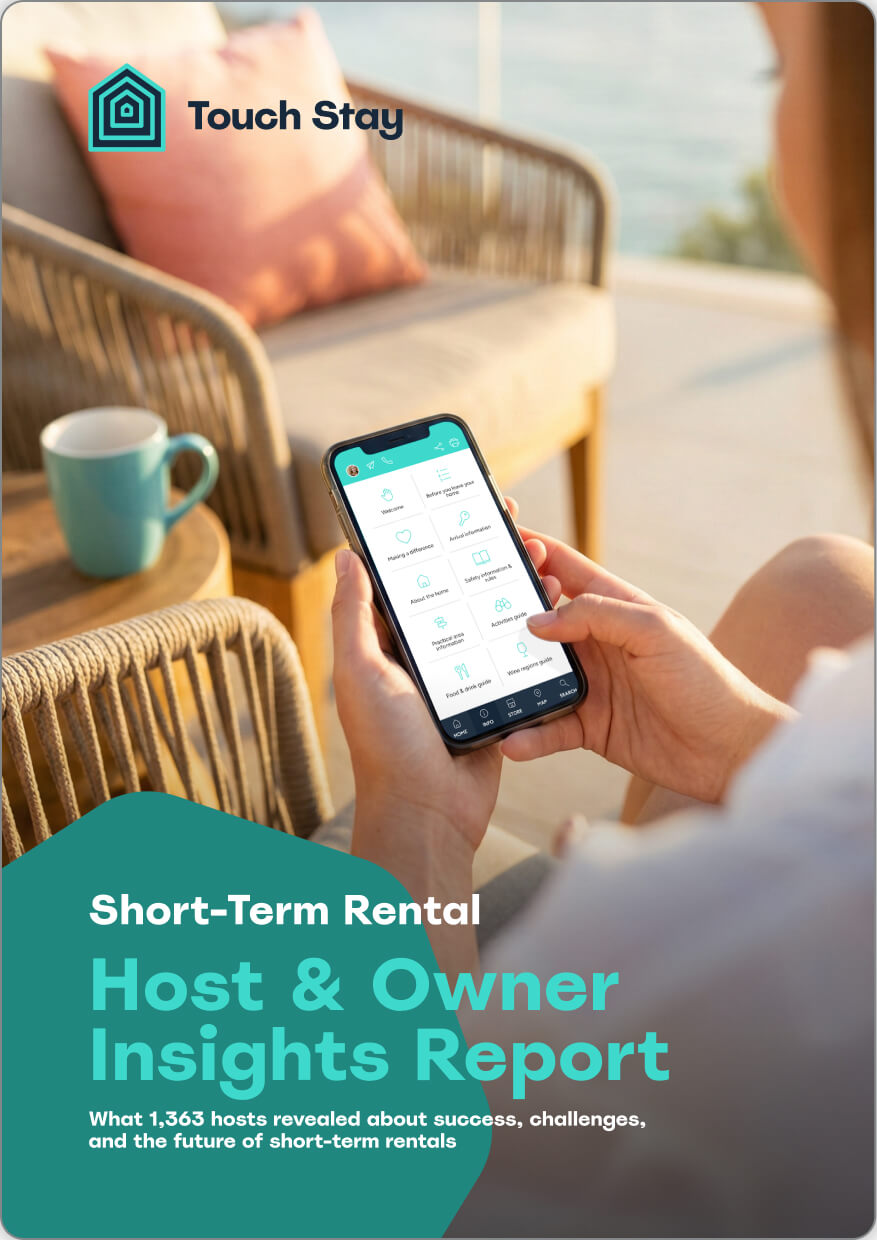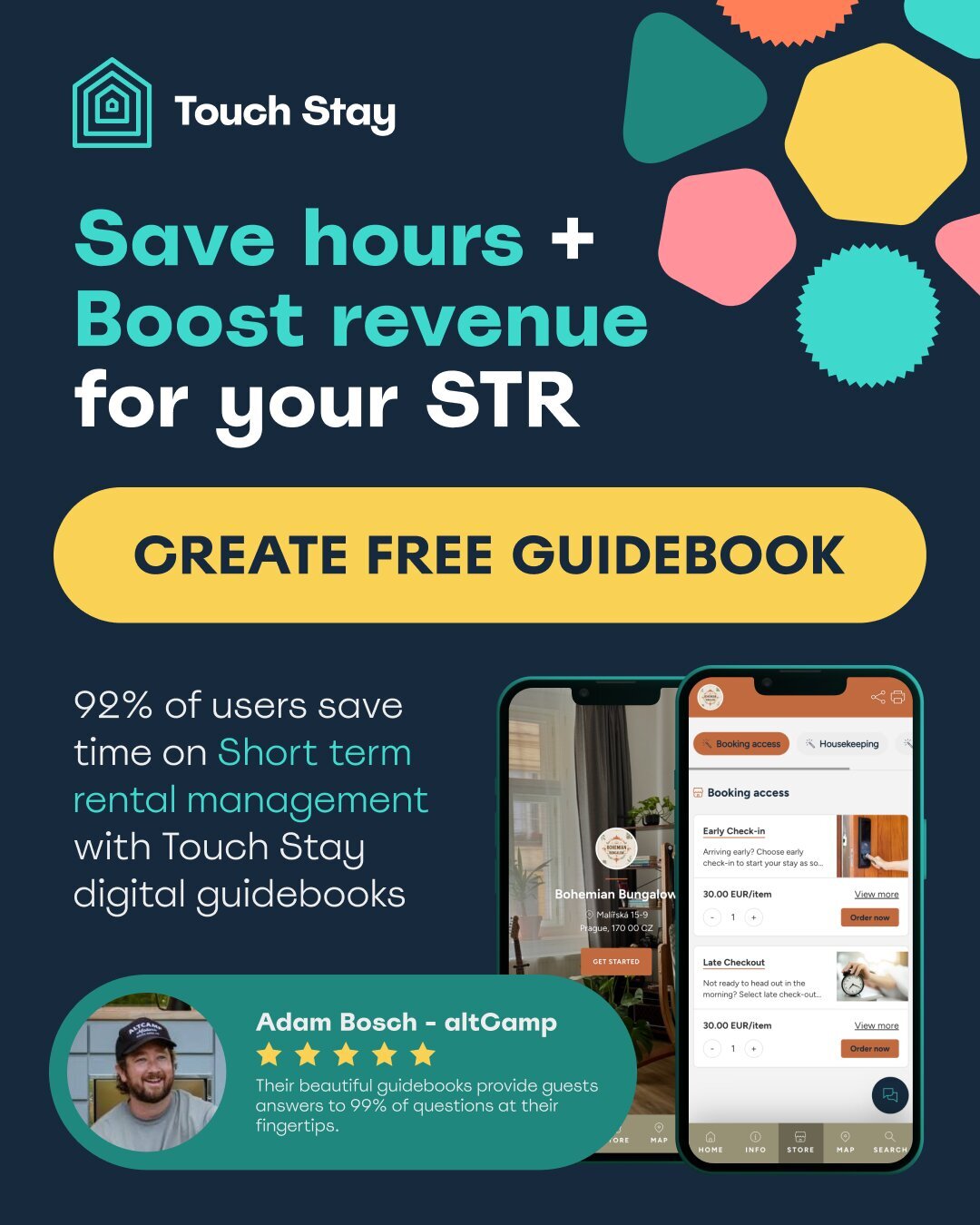Navigating Airbnb's service fees can be tricky, whether you're a host or a guest.
These fees can significantly impact your overall cost or earnings, making it essential to understand how they work.
This guide will break down the different types of Airbnb fees, how they are applied, and what you can do to manage them effectively.
What are Airbnb fees?
Airbnb fees are charges applied to both hosts and guests for using the Airbnb platform. These fees cover services like platform maintenance, customer support, and transaction processing.
Airbnb owner looking to offset fees?
Save time and generate upsells
Create your digital guidebook in 60 seconds.
How much does Airbnb charge?
The amount Airbnb takes from hosts depends on the fee structure chosen. Under the split fee structure, hosts typically pay around 3% of the booking subtotal. With the host-only fee structure, this amount increases to around 15%. Additionally, if you offer experiences on Airbnb, the service fee is 20% of the total price.
For example, if a host rents out a property for $200 per night and opts for the split fee structure, they would pay about $6 per booking to Airbnb. However, if they switch to the host-only fee structure, that fee could jump to $30 per night.
For a week-long booking, this difference can be significant, impacting the host's pricing strategy and profit margins. Understanding these fees and incorporating them into your pricing model is essential for maintaining profitability while remaining competitive in the market.
Types of Airbnb fees
Whether you're a guest searching for the perfect vacation rental or a host looking to maximize your earnings, it's important to get a clear picture of how Airbnb's fee structure works. These fees cover everything from platform maintenance to customer support.
Let's take a closer look at the different types of fees you'll encounter on Airbnb so you can navigate your next booking or hosting experience more easily.
|
Category |
Fee Type |
Description |
|
Host Fees |
Service Fee (Split-Fee) |
Hosts pay around 3% of the booking subtotal, while guests can be charged up to 14.2%. |
|
Service Fee (Host-Only) |
Hosts pay the entire service fee, typically around 15% of the booking subtotal. |
|
|
Airbnb Plus Host Fee |
Additional fee for listings that are part of Airbnb Plus, which offers verified quality and design. |
|
|
Co-Hosting Fee |
Fee for co-hosting services, shared between the host and co-host, negotiated based on their agreement. |
|
|
Cancellation Fee (Hosts) |
Fee charged to hosts for canceling a guest's reservation, especially on short notice. |
|
|
Guest Fees |
Cleaning Fee |
A one-time fee set by the host to cover the cost of cleaning the property after the guest's stay. |
|
Security Deposit Fee |
Refundable amount held to cover potential damages during the guest's stay. |
|
|
Cancellation Fee |
Fee incurred by guests for canceling a reservation, depending on the host’s cancellation policy. |
|
|
Currency Fee |
Conversion fee if payment is made in a currency different from the host's. |
|
|
Extra Guest Fee |
Charge for each guest exceeding the number included in the base rate. |
|
|
Pet Fee |
Additional fee for bringing pets, set by the host, and varies by listing. |
|
|
Service Fee |
Fee up to 14.2% of the booking subtotal for platform services, including customer support. |
|
|
Extra Fees |
VAT Fee |
Value-added tax applied in certain countries, added to the total booking cost. |
|
Airbnb Plus Host Fee |
Additional fee associated with Airbnb Plus listings, due to the premium service provided. |
|
|
Co-Hosting Fee |
Fee shared with a co-host for managing the property, based on their agreement. |
1. Airbnb host fees
For hosts, mastering the various fees tied to listing on Airbnb is key to keeping expenses in check and boosting earnings.
Airbnb charges hosts a service fee for using their platform, which covers the cost of advertising the listing, managing bookings, and providing customer support. There are two main types of service fees for hosts:
Split-fee
In this model, the service fee is split between the host and the guest. Hosts usually pay around 3%, while guests can be charged up to 14.2%.
This is the most common fee structure on Airbnb.
Host-only fee
In this model, the host pays the entire service fee, which is typically around 15%. This fee structure is common in countries where it is legally required to include all fees in the displayed price.
2. Airbnb guest fees
Just like hosts, guests are also subject to a variety of fees when booking a stay on Airbnb. These fees can add up quickly and significantly affect the total cost of a reservation. Understanding the different types of guest fees can help you budget more effectively and avoid any unpleasant surprises when it’s time to pay. Let's break down the various fees that guests might encounter during the booking process.
Guests may encounter several different fees that can impact the total cost of their reservation. Here are the main types of guest fees and what you can expect from each:
Cleaning fee
A one-time fee set by the host to cover the cost of cleaning the property after your stay. This fee can vary significantly depending on the property size and the host's cleaning requirements. For instance, a cleaning fee might be $50 for a small apartment or $150 for a larger house.
Security deposit fee
A refundable amount held by Airbnb to cover potential damages during the guest's stay. The host sets this amount, and it is returned to the guest after the stay if no damages are reported.
Cancellation fee
Depending on the host’s cancellation policy, guests might incur a fee for canceling their reservation, especially if it’s close to the check-in date. This fee compensates the host for the potential loss of income due to the cancellation.
Currency fee
If a guest’s payment is made in a currency different from the host's, Airbnb may charge a conversion fee to process the transaction in the required currency.
Extra guest fee
This fee is charged for each guest exceeding the number included in the base rate. For example, if a listing’s base rate covers two guests and you have four guests, you might pay an additional $20 per night for each extra guest.
Pet fee
An additional fee for bringing pets, set by the host and varying by listing. This fee might be a flat rate, such as $30 per stay, or a nightly rate, like $10 per night.
Service fee
This fee ranges up to 14.2% of the booking subtotal and covers Airbnb's customer support, platform maintenance, and various other services provided by Airbnb. For example, on a booking of $500, the service fee could be around $71.
3. Airbnb extra fees
VAT fee
A value-added tax (VAT) applied in certain countries, added to the total booking cost, including service and cleaning fees. The exact percentage depends on the local tax laws. For example, in most of Europe, the VAT is around 19-21% of the total booking cost.
Airbnb Plus host fee
These are additional fees associated with Airbnb Plus properties that have been verified for quality and design. These listings may come with higher service fees due to the premium service provided.
Co-hosting
If a host works with a co-host to manage their property, they might share the earnings, and a fee might be charged for the co-host's services, typically negotiated between the host and co-host.
Cancellation fee (for hosts)
In some cases, Airbnb may charge a fee to hosts if they cancel a guest’s reservation, especially on short notice. This fee is meant to discourage last-minute cancellations that can disrupt a guest’s travel plans.
How much do Airbnb hosts make?
The amount Airbnb hosts make varies widely depending on factors like location, property type, pricing, and occupancy rates. Hosts in popular tourist destinations or high-demand areas can earn significantly more, especially if they have desirable amenities and maintain high ratings.
On average, hosts can earn anywhere from a few hundred to several thousand dollars per month. According to Airbnb, “the typical Host in the US earned approximately $14,000 in supplemental income in 2022.”
How to manage Airbnb fees?
Managing Airbnb fees effectively is key to staying profitable as a host. Here are some strategies to help you manage these costs while maximizing your earnings:
1. Add fees to your costs
To manage Airbnb fees effectively, hosts should incorporate all applicable fees, including service fees, cleaning fees, and any extra guest charges into their overall pricing structure. This helps make sure your listing stays profitable, even after the fees are taken out. For example, if Airbnb's service fee is 15%, hosts should calculate their desired earnings and then set a price that covers the fee while still being competitive.
2. Stay competitive
Staying competitive in the Airbnb market involves regularly reviewing and adjusting pricing based on local market trends. Hosts should monitor their competitors' listings, including the fees they charge, and adjust their own prices accordingly. Offering a competitive rate, especially during peak seasons or in high-demand areas, can attract more bookings and increase occupancy rates.
3. Use dynamic pricing
Dynamic pricing involves adjusting your rental rates based on factors such as seasonality, demand, and local events. During high-demand periods, such as holidays or festivals, hosts can increase their rates to maximize earnings. On the other hand, lowering prices during slower periods can help maintain a steady stream of bookings. Using dynamic pricing tools can automate this process so that your rates are always optimized for current market conditions.
Managing your Airbnb fees is only part of running a successful rental - clear, professional communication with guests is just as important. To help you save time and deliver a great guest experience, we’ve created a free resource for hosts.

Download The Ultimate Guest Communication Templates—a free, ready-to-use PDF packed with message templates for every stage of the guest journey.
4. Charge for extra services
Hosts can increase their earnings by offering additional services for a fee, such as airport pickups, guided tours, or early check-in/late check-out options. These extra services add value for guests while providing hosts with an additional revenue stream. It's important to clearly list these services and their associated costs in the listing to manage guest expectations.
5. Try other platforms
Expanding your reach by listing your property on multiple rental platforms, such as Vrbo, Booking.com, or Expedia, can increase visibility and bookings. While each platform has its own fee structure, diversifying where you list your property can help mitigate the impact of fees on any single platform. It's also a good way to reach different audiences and reduce dependency on Airbnb alone.
6. Build a booking website
Creating your own booking website allows you to avoid platform fees altogether for direct bookings. By driving traffic to your website through social media, SEO, and online advertising, you can secure reservations without paying third-party commissions. This approach gives you greater control over your business and can lead to higher profits in the long term, although it requires an initial investment in website development and marketing.
7. Use a channel manager
A channel manager is a tool that helps hosts manage multiple property listings across different platforms from a single interface. It synchronizes availability calendars, pricing, and bookings, reducing the risk of double bookings and saving time on manual updates. Some popular channel managers include Guesty, Hostaway, and Lodgify. Each comes with its own pros and cons:
- Guesty: Offers comprehensive features, including automation and reporting, but can be expensive for smaller hosts.
- Hostaway: Known for its ease of use and good customer support, but may lack some advanced features needed by larger property managers.
- Lodgify: Provides a user-friendly interface and website-building tools, though it may not offer as many integrations as other options.
8. Connect Airbnb listings to Touch Stay
By integrating Touch Stay, you can provide guests with essential information about the property, local recommendations, and house rules all in one place, accessible from any device.
Benefits for Airbnb Hosts:
- Enhanced guest experience: A digital guestbook helps guests feel welcomed and informed, which can lead to better reviews and repeat bookings.
- Time savings: By automating guest communication through Touch Stay, you can save time that would otherwise be spent answering repetitive questions. The platform allows you to update information easily so guests have access to the most current details about your property at all times.
- Professional presentation: Touch Stay’s sleek and modern interface gives your guest information a professional look, which can set your property apart from others and contribute to a more memorable guest experience.
We'd love to show you how Touch Stay guidebooks can be tailored to benefit your listing!
How to avoid Airbnb guest fees?
Book longer stays
Many hosts offer discounts for longer stays, which can help offset the service and cleaning fees. For example, booking a stay for a week or longer might qualify you for a 10-20% discount, significantly reducing the per-night cost. This is particularly beneficial for those planning extended vacations or business trips.
.png?width=800&height=450&name=Airbnb%20weekly%20discount%20(1).png)
Look for listings with lower fees
Some listings have lower cleaning or service fees. When searching for accommodations, use filters to compare different listings and find options with the most reasonable fees. For example, a listing with a $20 cleaning fee versus another with a $100 fee can make a big difference in your total cost.
Try direct booking
In some cases, communicating directly with the host can lead to waived or reduced fees, especially for longer stays or special circumstances. Politely asking about the possibility of a discount or fee reduction can sometimes yield positive results, particularly if the host values your potential long-term booking or repeat business.
Book during off-peak season
Booking your stay during off-peak times can sometimes lead to lower fees. Hosts may reduce their prices and fees during periods of low demand to attract more guests. Plan your trip for times when fewer people are traveling to take advantage of these lower rates.
Look for bundled services
Some hosts might be open to bundling services to reduce costs. For example, if you're planning a long stay and need additional amenities like extra cleaning services or airport pick-up, negotiating a package deal can sometimes lead to overall savings.
Try other rental platforms
While Airbnb is popular, exploring other rental platforms like Vrbo, Booking.com, or even local alternatives can sometimes lead to lower fees. Each platform has its own fee structure, and comparing options can help you find the best deal for your needs.
Book a hotel room
Depending on your destination and needs, booking a hotel room instead of an Airbnb may be more cost-effective. Hotels often include amenities like daily cleaning, room service, and other conveniences without additional fees, which can simplify budgeting for your trip.
Frequently asked questions
Understanding Airbnb fees is crucial because they directly impact both the cost for guests and the earnings for hosts. For guests, knowing the fees helps in budgeting and avoiding surprises during booking. For hosts, being aware of the fee structure allows them to price their listings competitively while ensuring profitability. Additionally, understanding these fees enables both parties to make informed decisions and manage their financial expectations effectively.
The 15% host fee on Airbnb refers to the service fee that hosts may have to pay when they opt for the "host-only fee" structure. In this model, the host covers the entire service fee, which is typically around 15% of the booking subtotal. This fee structure is common in regions where it's required to display all fees upfront in the listing price, ensuring transparency for guests. The host-only fee model often results in a higher percentage fee compared to the split-fee structure.
The standard fee structure on Airbnb is the "split-fee" model, where the service fee is divided between the host and the guest. Hosts generally pay around 3% of the booking subtotal, while guests can be charged up to 14.2% of the booking subtotal as a service fee. This split-fee model is the most commonly used on Airbnb, as it allows both parties to share the cost of using Airbnb's platform and services.
No, Airbnb does not always charge a cleaning fee; it is up to the individual host to decide whether or not to include one. The cleaning fee is a one-time charge set by the host to cover the cost of preparing the property for the next guest. The amount can vary significantly depending on the property size and the host's cleaning standards.
An Airbnb host can charge guests for several additional costs beyond the base rental fee. Common charges include a cleaning fee, an extra guest fee for additional occupants beyond the base rate, a pet fee for bringing pets, and occasionally a security deposit to cover potential damages. Hosts may also charge for additional services or amenities, such as early check-in, late check-out, or airport transfers.
Airbnb taxes and fees can feel high because they consist of several different costs, including service fees for both the host and the guest, cleaning fees, and local taxes or VAT. These fees are designed to cover the operational costs of the platform, including customer support, marketing, and transaction processing. In some cases, local regulations require Airbnb to collect and remit taxes on behalf of the host, which can add to the overall cost.
Airbnb can charge extra for additional guests beyond the number included in the base rate of the listing. This fee is set by the host and can vary depending on the property. For example, if a listing’s base rate covers two guests and you have four guests, you might be charged an extra fee per night for each additional guest. This fee helps hosts cover the additional costs associated with accommodating more people, such as extra utilities and cleaning.
Airbnb hosting can be worth it for many individuals, particularly those looking to generate extra income from their property. The platform provides a way to reach a large audience of potential guests and offers support in managing bookings and payments. However, the profitability of hosting on Airbnb depends on several factors, including location, property type, pricing, and how well the host manages expenses like cleaning and service fees.

Diana Bocco
Diana Bocco is an experienced writer with a passion for creating engaging content for the hospitality technology and travel sectors. Aside from a portfolio featuring work for industry giants like Booking.com and TripAdvisor, Diana also has extensive experience in creating business and e-commerce content. An avid traveler herself, Diana combines her on-the-road insights with professional expertise to help vacation rental owners enhance guest experiences and grow their businesses.
Be the first to know!
Join our newsletter for early access to:
- ✅ Free guides
- ✅ Pro tips & tricks
- ✅ Time saving tutorials
- ✅ Latest blog posts
- ✅ Checklists & templates









.png?width=50)












